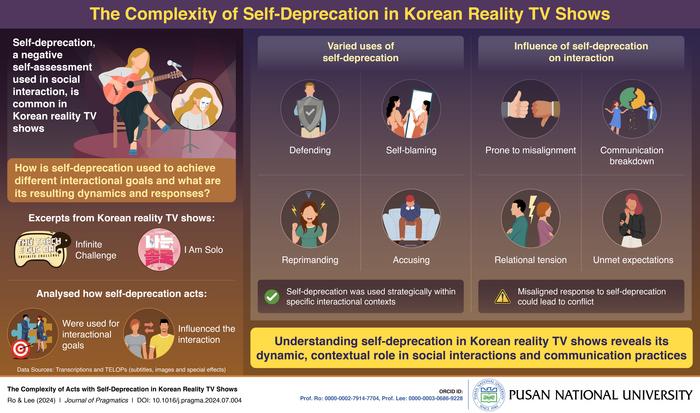Self-deprecation, a negative self-assessment used in social interaction, is prevalent in Korean reality TV shows. Traditionally, psychology views self-deprecation as indicative of low self-esteem or related psychological disorders, such as depression or eating disorders.

Credit: Eunseok Ro from Pusan National University and Josephine Mijin Lee from Ewha Womans University
Self-deprecation, a negative self-assessment used in social interaction, is prevalent in Korean reality TV shows. Traditionally, psychology views self-deprecation as indicative of low self-esteem or related psychological disorders, such as depression or eating disorders.
In a recent study by Professors Eunseok Ro from Pusan National University and Josephine Mijin Lee from Ewha Womans University, the focus shifts from a pathological view to an interactional one, revealing the complex dynamics of self-deprecation in social interactions. Their study, published online on July 22, 2024 in the Journal of Pragmatics, suggests that self-deprecating remarks often serve broader interactional purposes. “Existing research has primarily analyzed data where self-deprecation is the central topic of the conversation. The present study contributes to an endogenous understanding of acts with self-deprecation by examining interactional episodes where the relevance of self-deprecation is momentarily suspended until other interactional exigencies are resolved,” explains Profs. Ro and Lee.
The researchers analyzed three excerpts from Korean TV shows, Infinite Challenge and I Am Solo. Through detailed conversation analysis, they examined the participants’ self-deprecating actions, the responses they elicited, and the interactional consequences.
In Infinite Challenge, self-deprecation was used as a defense against a false accusation, leading to a humorous interaction. The excerpt analyzed highlights how participants created humor by breaching social norms around minimizing agreement with self-criticism. Conversely, in I Am Solo, self-deprecation was used to self-blame, reprimand, and accuse to solicit an apology. Further, the excerpts from I Am Solo demonstrated how misinterpreting self-deprecation can lead to unmet expectations, communication breakdowns, and relational tension. These examples underscore the complexity of self-deprecation in social interactions, where its meaning can vary widely depending on context. For instance, in I Am Solo, Gwangsu misinterpreted Yeongsook’s self-deprecation as self-aggrandizement. When Yeongsook intended her self-criticism as an accusation, Gwangsu responded with consolation rather than an apology. Such misunderstandings can lead to emotional reactions, as seen in Yeongsook’s tears. Therefore, self-deprecation should be handled carefully to avoid negative outcomes, as these examples reveal.
“Our findings reveal that self-deprecation can serve different interactional goals, such as defense, reprimand, and accusation, depending on the context. Responses to self-deprecation vary widely and can lead to misalignments, misunderstandings, and relational tension,” observes Profs. Ro and Lee. Sensitivity to self-deprecating remarks is crucial to avoid unfortunate consequences. Sensitivity to self-deprecating remarks is crucial to avoid negative outcomes, as responses depend on the specific context and participants’ goals.
In conclusion, the study illustrates the complexity of self-deprecation within conversational contexts. Self-deprecation is not merely a negative self-assessment but a strategic tool for achieving various interactional goals. The findings emphasize the importance of understanding the specific context and underlying expectations behind self-deprecating remarks to navigate interactions effectively and empathetically. By developing a sequentially sensitive approach to self-deprecation, this study deepens our understanding of this practice in social interaction.
***
Reference
DOI: 10.1016/j.pragma.2024.07.004
About the institute
Pusan National University, located in Busan, South Korea, was founded in 1946 and is now the No. 1 national university of South Korea in research and educational competency. The multi-campus university also has other smaller campuses in Yangsan, Miryang, and Ami. The university prides itself on the principles of truth, freedom, and service, and has approximately 30,000 students, 1200 professors, and 750 faculty members. The university is composed of 14 colleges (schools) and one independent division, with 103 departments in all.
About the authors
Prof. Eunseok Ro is an associate professor at the Department of English Education at Pusan National University. He received a Ph.D. in Second Language Studies from University of Hawai’i at Mānoa in 2017 and worked as an assistant professor at City University of Hong Kong and Kangwon National University. His research is centered on the application of conversation analysis in (L2) interaction studies, examining teacher-student talk, video-mediated interaction, and media discourse.
ORCID id: 0000-0002-7914-7704
Prof. Josephine Mijin Lee is an associate professor of English Education at Ewha Womans University in Seoul, South Korea. She received a Ph.D. in Second Language Studies from University of Hawai’i at Mānoa in 2015. Her research interests center on applying ethnomethodology and conversation analysis to studies on L2 pedagogy, classroom interaction, and pragmatics.
ORCID id: 0000-0003-0686-9228
Journal
Journal of Pragmatics
Method of Research
Content analysis
Subject of Research
People
Article Title
The complexity of acts with self-deprecation in Korean reality TV shows
Article Publication Date
22-Jul-2024
COI Statement
The authors declare that they have no competing interests



